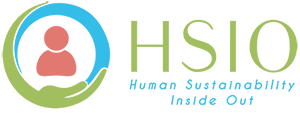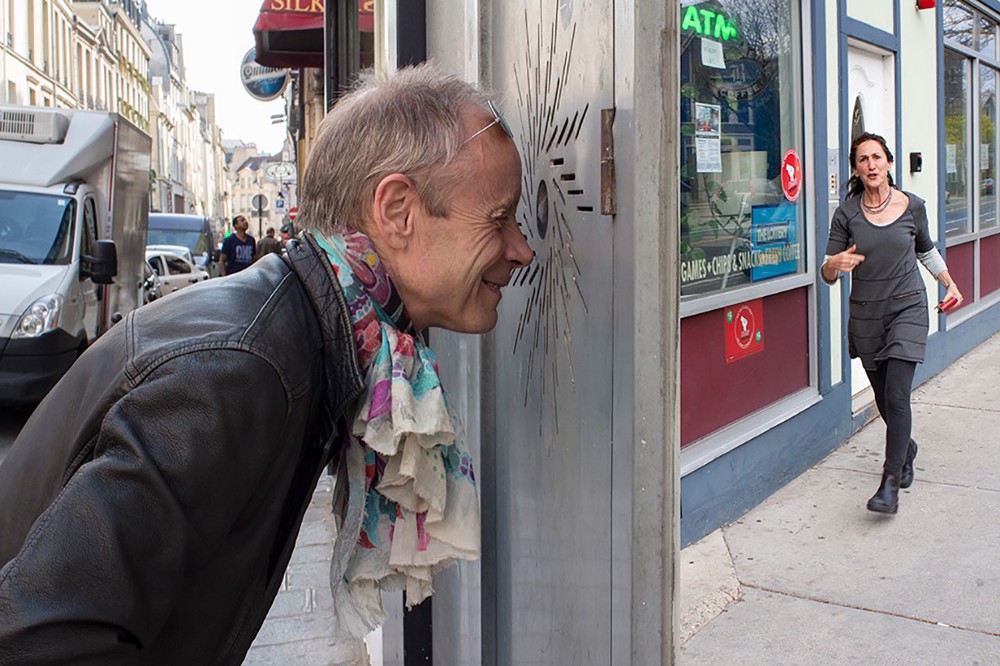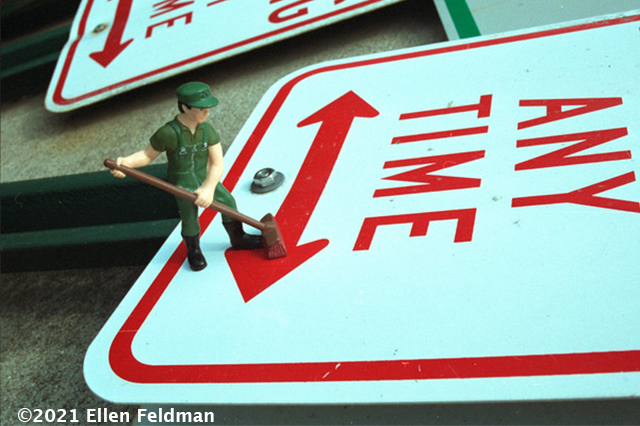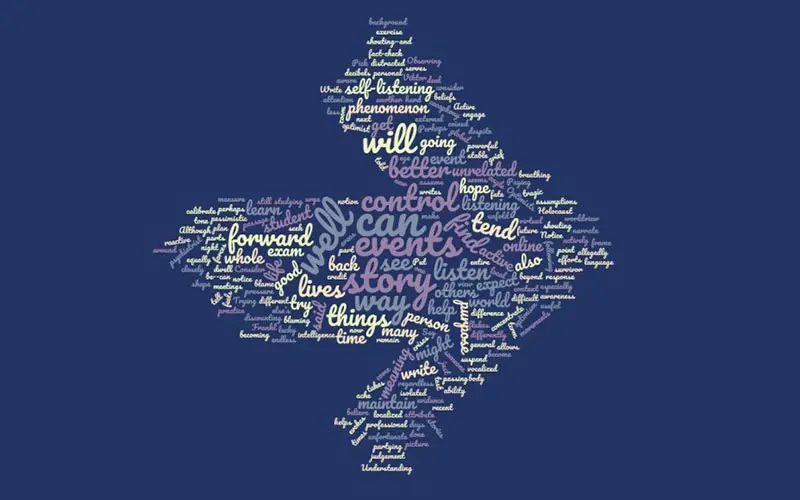Open talent platforms are in a unique position to pioneer and design the future of work. Interest in the “freelance revolution” is strong — there were already 60 million freelancers in the U.S in 2020 (up two million from the prior year). With the rapid growth of the open talent arena, new challenges arise, both out of the pandemic, but also from new styles and ways of working.
With an estimated 1.2 billion freelancers around the world, so 1/3 of the total global workforce, major platforms such as UpWork, Fiverr, Indeed, guru.com, etc. have huge power and leverage in the labor market.
What should platforms do to ensure that they support their talent?
The Pros and Cons of Being an Independent Worker
Independent workers can avoid three major sources of stress at work: 1. Poorly structured tasks that do not correspond to our skills and patterns of work; 2. working hours that cramp our preferred lifestyle and hurt our sleep, and 3. obnoxious colleagues and toxic bosses.
However, independent workers and entrepreneurs are more vulnerable. Very few have backups or safety nets. They do not benefit from resources such as Employee Assistance Programs, paid time off, mental health leaves, mindfulness apps, and stress management seminars that companies increasingly provide. As the “product,” they need to present a brave, happy, in-control face and project an air of competence.
Independent workers also cannot engage in what is called presenteeism — being there but not engaged, not fully there. There are no corporate peers to pick up the slack when someone is on leave or needs support. Their most critical resource to be managed is their brain.

Finally, independent workers can feel isolated, as if their work were done on an island, perhaps with fewer brainstorming opportunities with colleagues. Onboarding can be haphazard and the freelancer is often expected to “just figure it out.” In addition, the level of skepticism on the part of HR and finance departments, and sometimes hiring managers, can increase the pressure on freelancers.
As the world finally focuses on the connections between work and mental health, we have the opportunity and duty in the open talent world to devise a “blend of best” — freedom and support. Doing so will be imperative to achieve our Center for the Transformation of Work’s goals to bring a “new level of diversity, equity and inclusiveness to work” and “transform work for a billion people by 2025.” We need to ensure that open talent careers can be passionate, fulfilling, and sustainable. The world is watching and eager to reward organizations that try to minimize their negative impact on others. So how should platforms engage?
Making sure the liquid workforce is on solid mental health grounds
While it is sexy, being one’s own boss is challenging.
Entrepreneurship and branching out on one’s own can entail financial and personal risks. Being an entrepreneur or open talent requires a set of skills that are not common. For example, consider the software engineer who now needs to develop P.R. skills, marketing knowledge, and H.R. expertise while managing operations and the back-office. Freelancing is not just one job; rather it requires multiple hats and a multi-faceted set of skills. These challenges can make an entrepreneur feel powerless.
According to freelancer and entrepreneur Chris “Link” Duarte, it can be pretty isolating, and even aggravating to be on one’s own. “Sure, I talk to dozens (sometimes hundreds) of people per week, but at the end of the day, it feels pretty lonely running my company alone from my home or car,” he explains. “I often wish there were marketplace hubs, just for resources and support-a community, for people like us. A place where we could go online, a place for freelancers, where I could find my ‘people.’”
As entrepreneurs deal with the day-to-day administration of their new businesses (as well as frequent rejections), they find themselves making difficult decisions that will affect the future of their companies, often in the face of great uncertainty and with incomplete information.
All of this can affect their mental health over time. The WHO believes that about half of entrepreneurs will have “one or more mental health diagnoses.”[a] Access to mental health and medical support is even harder. A U.S. survey showed that a quarter of entrepreneurs did not have health insurance, and 17% said they “struggled to afford healthcare/medicine.”[b]
To improve access and affordability, platforms need to connect talent with resources and support. Strong support networks are shown to encourage a broader understanding and adoption of diversity, equity, and inclusion, which should be at the heart of every platform. Investing in talent ultimately can help the platforms, too.
Play your individual part — as talent.
Colleagues burning out and engaging in erratic, problematic behavior at work impact many others around them. In Open Talent, the effect is less visible to the professional community but extends to personal lives and local communities. Family, friends, and even investors are often directly (and certainly financially) involved or impacted by mental health issues.
As Open Talent, we bear a responsibility to take care of ourselves, and take steps to recognize and address specific triggers of depression and anxiety. We also bear a responsibility to others:
- Do we demand too much of others or have unachievable, unrelenting standards for ourselves?
- Are we respectful and mindful of others’ time, schedules and needs? Do we ask before we demand? Do we let clients demand too much of us?
- Do we glorify our ability to take on more work with less sleep and when do we just show off?
- What are we doing to contribute to improving the system versus to what extent are you exacerbating stressors?
“It is not easy,” said one of our CTW members. “People do not want to tell the remote world that they are struggling” because it can be risky for one’s reputation. Second, it may be met with derision. “The perception from others is that the freelancer is lucky. ‘They make more money, they get to work from home, they work less, they are their own boss.’ The freelancer doesn’t want the world to know that they do not feel as skilled, or are of a demographic that is not accepted, or cannot live up to others’ expectations. Sometimes how long a project should take rather than how long it does take creates stress and conflict.”
Take responsibility for creating a world you want to see — as forward-thinking platforms.
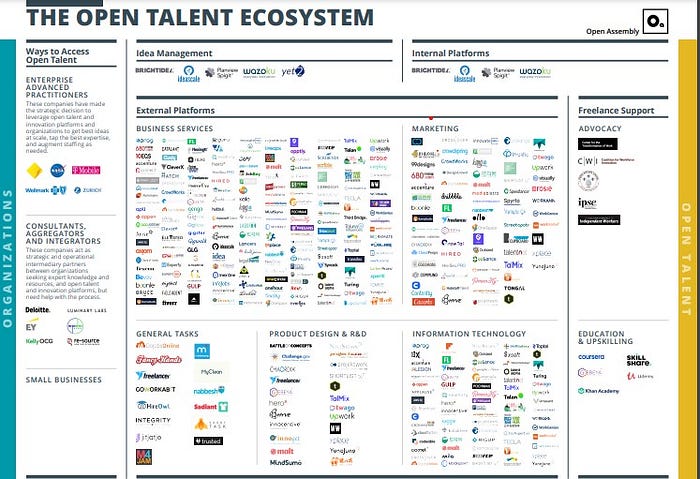
The promise of a rapid-cycle, liquid workforce is clear. When clients have access to on-demand talent vs. “owning,” they are less invested in protecting that talent. So, whose responsibility is it to fix this and reduce the impact? If platforms use up and spit out talent, who picks up the pieces? What are our ethical responsibilities here? Platforms can help here in four major ways:
Promote fit. Is talent realistic about what it takes to succeed? Can platforms include more behavioral questions in their onboarding questionnaires to encourage individuals to reflect if Open Talent is really the life they want to lead? We adapt some good suggestions from the SBA below:
- Are you risk-hungry or risk-averse or risk-prone?
- Do you take initiative and seek independence or do you need others to motivate you?
- Do you have a strong support network? Who will catch you if you fall? Where will you go for advice?
- How do you respond to failure and rejection?
- Are you passionate about solving a customer problem or motivated by financial return?
- What steps will you take to cultivate a healthy balance between your life and company? Do you feel that you have the tools and skills to sustain your well-being at work? How will you measure it?
- Is the livelihood of your family at stake?
Help talent and clients set guidelines. To promote human sustainability, expectations for projects and jobs need to be clearly outlined. Many freelance jobs and projects are being done without contracts or are based on loosely worded verbal agreements where there is an expectation of a certain level of contribution from the freelancer to prove that they can do the job before they actually ever get paid. In other words, they perform work for free to prove themselves. This is a source of enormous stress.
Be creative about resources. Platforms could work together to create resource marketplaces. Resources should also include education and simple learning tools to help freelancers navigate the freelance world. Those can be third-party. Platforms need to be mindful that external resources exist and be willing to partner. For example, a platform offering remote caregiving jobs does not have to provide caregiver support groups, but it should provide links to resources that provide free support groups, including peer-led support circles. Many corporate benefits are one size fits all —discount on gym memberships and access to mindfulness apps. But if massage is one’s relaxation go-to, that is out of pocket. Platforms can negotiate better deals with providers and perhaps provide more variety as they are, by design, more talent-focused than larger firms might be.
No matter the approach, privacy here is key. Much as EAPs are confidential (companies just see aggregate use data), platforms need to provide a level of security. Some freelancers do not seek support for fear that their employer will know that they suffer mental health challenges and that their information will be leaked to other potential employers.
Be innovative and use science, including social science. In the current chatter around mental health, we seem focused on the self, as we are in many parts of our lives. Yet it is becoming obvious that being too self-centered is not good for our mental well-being, and plays into the rampant narcissism monster fed by the social media platforms. We should look inward differently — focusing on our brain and sleep and the gut biome, the machinery that supports and enables well-being.
Downstream, we should focus on our community and helping others. Options here include setting up “mental health buddies,” providing opportunities to engage in volunteer activities while still being paid (like pro bono consulting arrangements), encouraging platform workers to connect and build bonds beyond their jobs, such as organizing virtual/in-person happy hours, creating shared interest groups, identifying co-working spaces to build community among individuals working from the same location. Open Talent is all about connections. Explore them here.
Beware of biases. Platforms are doing their best to engage a more diverse workforce by attracting younger users, people of color and LGBTQ+, for example; however, while targeting younger users and people of color, platforms and companies may be leaving other groups behind. If they attract younger talent, for example, what happens to the older individuals who might be getting left behind with the advent of new technologies? The perception is that older users do not need help and are already successful, when in reality, machines target younger users and older ones are not being identified by algorithms. And how do platforms define and exhibit diversity?
Learn from others to create a blend of best.
The approach taken by Karina Rehavia, founder and CEO of Brazil-based Ollo, brings ideas and shows the potential. The Kantian imperative drives her management style — treat others as they would wish to be treated. “We all want to feel protected, respected, to belong, and to earn responsibly,” she noted. “We only have each other, which is now particularly important as many people are on the verge of a mental breakdown.”
A fundamental philosophy at Ollo is “think community, not just platform.” Ollo prides itself on its humanistic approach to recruiting and applies technology to boost human potential, not to replace it. “Knowing that there are people out there looking out for you can be a very powerful influence on how people feel. We have an incredible opportunity to foment the sense of belonging within our community and positively affect hundreds of people’s lives every day. This is what drives us, and we take this very seriously.”
A more horizontal way of working, with less hierarchy and more collaboration, is, in fact, an aspect of the open talent economy that attracts more and more professionals and that can be key in enhancing mental well-being. Ollo also practices “enquire before judging” — if someone is late to a call or experiences friction on a client engagement, Ollo’s team tries to assume the best and consider all alternatives. Pausing before rushing ahead takes more time, Rehavia notes, but it pays off in greater retention and engagement with the platform.
Finally, Karina lives by her values: admits when she is having a bad day, something is worrying her, or she doesn’t know how to solve a problem or a situation — and she has learned how to ask for help:
“Many people, myself included, were raised within the context of ‘boys don’t cry’ and that women need to mimic what is thought to be ‘men’s attitudes’ in a business setting to be successful. The combination of these two things drives us to hide our emotions in the workplace and to see vulnerability as a sign of weakness. When I learned to embrace my vulnerability and to let my emotions show, I became a better leader and a better human being.”
In the 18 months since its launch, Ollo has built an active and engaged community with some of the best talents in South and Latin America, servicing 50+ clients worldwide with a steady 67% repurchase rate.
Set the stage for the future of sustainable work.
Sustainable development has been suggested to promote healthier organizations and to find a balance between ever-changing working conditions and workers’ well-being. Today’s work culture of “always-on,” demanding job requirements and negative leadership styles are creating unsustainable workplaces that can harm people’s sense of well-being. Even before the pandemic, 83% of U.S. workers reported suffering from work-related stress, causing 120,000 deaths per year in the U.S. alone. Young people report more stress than their elders.
By democratizing access to job opportunities, platforms level the field and break traditional business hierarchies. They connect people who share the same challenges, interests, and needs despite working in different sectors. Open talent is indeed the foundation and main engine of the future of work.
Open platforms benefit from creative and innovative talent. Their members are agile and open-minded entrepreneurs who are transforming the future of work. But their well-being and mental health can’t be considered as a tradeoff anymore. It will be a must-have, a foundational pillar of the future of sustainable work.
Workers in the open talent economy could be the champions of human sustainability. The support and creativity of open talent platforms will be key to making this happen.
*****************************************************************
By: Center for the Transformation of Work members Chris Link Duarte, Carin-Isabel Knoop, Bahia El Oddi, Karina Rehavia, inspired by many others. Lead photo by the inimitable Ellen Feldman.
[a] Freeman’s research has shown that start-up founders are: 2x likely to suffer from depression; 6x more likely to suffer from ADHD; 3x more likely to suffer from substance abuse; 10x times more likely to suffer from bipolar disorder; and twice as likely to have a psychiatric hospitalization and suicidal thoughts.
[b] Observers commented: “The reason . . . is not clear, but it could either reflect the high cost of health insurance for individuals and small business owners, or a greater willingness on the part of entrepreneurs to accept the risks inherent in not having health insurance.” Source: Dan Witters, Sangeeta Agrawal, and Alyssa Brown, “In U.S., Entrepreneurs Have Health Edge,” Gallup, November 12, 2013, http://www.gallup.com/poll/158726/entrepreneurs-health-edge.aspx, accessed February 2017.
